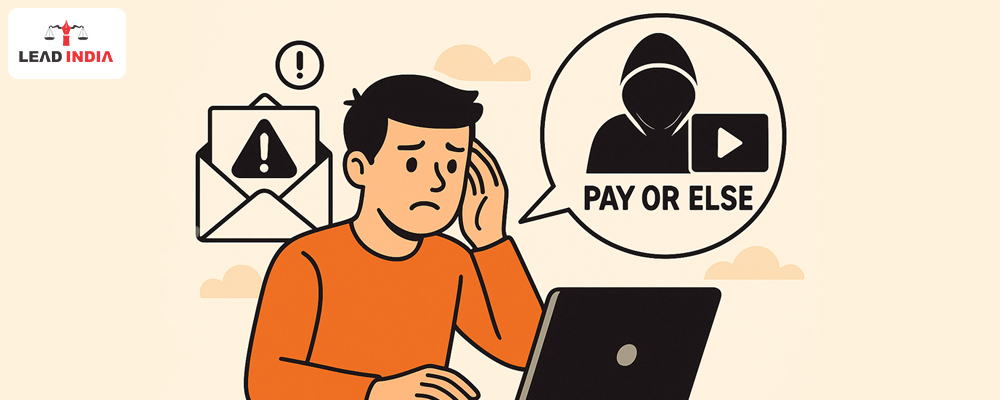Blackmailing is the act of threatening a person to reveal their private information, or a kind of extortion to give something in return, or keeping a person in fear to reveal secrets, or something harmful unless they meet certain demands usually involving money, property, or favors.
It involves coercion through fear such as:
- Threatening to expose private photos or videos.
- Threatening to leak personal conversations or past relationships.
- Forcing someone to do something illegal to protect their reputation.
While the term “blackmail” is not directly given in the BNS, the act falls under various criminal offenses, including criminal intimidation, extortion, and cybercrime, depending on the situation and the facts of the case.
If it happened then What Next?
Imagine you’re chatting with someone online, and suddenly, you’re being threatened with a private video. Your heart races. You’re scared, unsure what to do. This situation is more common than you think and yes, the law is on your side.
Blackmail using morphed or secretly recorded videos has increased dramatically in India, thanks to apps like WhatsApp, Instagram, and Facebook. But here’s the truth: you have the right to fight back — legally and fearlessly.
Need A Legal Advice
The internet is not a lawyer and neither are you. Talk to a real lawyer about your legal issue

Your Legal Lifeline: Laws That Protect You from Video Blackmail
1. Indian Penal Code (IPC): Your Reputation Matters
- Section 503 – Threats or intimidation are punishable.
- Section 384 – Making unlawful demands = extortion = jail time.
- Section 292 – Deals with obscene content distribution.
- Section 499/500 – Defamation using fake or morphed videos.
2. Criminal Procedure Code (CrPC): Get Ahead of the Threat
Section 108(1)(i)(a) – You can approach the magistrate if you suspect someone may leak your video. The law allows the magistrate to intervene before damage is done.
3. Information Technology Act, 2000: Your Digital Shield
- Section 66E – Protects your private images from being recorded or shared.
- Section 67 – Covers transmission of obscene digital content.
- Section 67A – Prevents hidden camera misuse or distribution of explicit content.
Step-by-Step: What You Should Do Right Away
1. Don’t Give In — Stay Calm and Say No
Do not fulfill the blackmailer’s demands. Once you do, they’ll ask for more. Break the chain now.
2. File an FIR at Your Nearest Police Station
Cyber blackmail is a criminal offence. Walk into your nearest police or cyber cell and file a report. Be honest. You are protected under law.
3. Speak to a Cybercrime Lawyer Immediately
You might feel hesitant sharing your story — that’s normal. But a lawyer is legally bound to protect your privacy and guide you through every step.
4. Report the Blackmail Anonymously
If you’re scared or embarrassed, visit www.cybercrime.gov.in. You can report without revealing your name.
5. Visit a Cyber Cell – Any City Works
Cybercrimes don’t need to be reported only in your home city. Jurisdiction is pan-India.
6. Women Can Reach Out to NCW
If you’re a woman and don’t know who to turn to, contact the National Commission for Women. They offer 24/7 support.
At Lead India, we’ve helped hundreds of people like you stand up to online harassment and blackmail. We understand your fear. We value your privacy. And most importantly, we stand by you.
LandMark Judgment
State of Maharashtra v. Mohd. Ajmal Amir Kasab (2012)
This case helped define the use of fear or threats to influence someone’s actions as criminal intimidation under IPC.
Shreya Singhal v. Union of India (2015)
This Supreme Court judgment struck down Section 66A of the IT Act for being too vague.
Khushboo v. Kanniammal (2010)
Reinforced the idea that freedom of expression does not allow one to blackmail or threaten someone for personal benefit.
Conclusion: Take Back Control
Being blackmailed is traumatic. But silence only empowers the blackmailer.
Here’s what you can do today:
- Speak up.
- Report the crime.
- Seek expert legal help.
Every Woman deserves to feel safe, respected, and free. Lead India is always there to help you with experienced cybercrime lawyers who will guide you with care and confidentiality.
One can talk to lawyers from Lead India for any kind of legal support. In India, free legal advice online can be obtained at Lead India. Along with receiving free legal advice online, one can also ask questions to the experts online free through Lead India.
FAQs
1. What if the blackmailer is based in another country?
You can still report the crime in India. The cyber cell will coordinate with central agencies like CERT-In or Interpol if cross-border action is needed.
2. Can a minor file a complaint if someone is blackmailing them with a video?
Yes. Minors are protected under the POCSO Act. A trusted adult or guardian should help file the complaint, and special procedures apply to protect the child’s identity.
3. Will the police take immediate action on my blackmail complaint?
If you provide sufficient evidence (screenshots, messages, recordings), the police are required to act. Immediate FIR registration may be done in cases of sexual blackmail or extortion.
4. Can I delete the video or chat before reporting it?
No. Preserve all evidence — messages, call logs, videos, screenshots — even if it feels uncomfortable. This is critical for filing an FIR and for the investigation.





 Talk to a Lawyer
Talk to a Lawyer